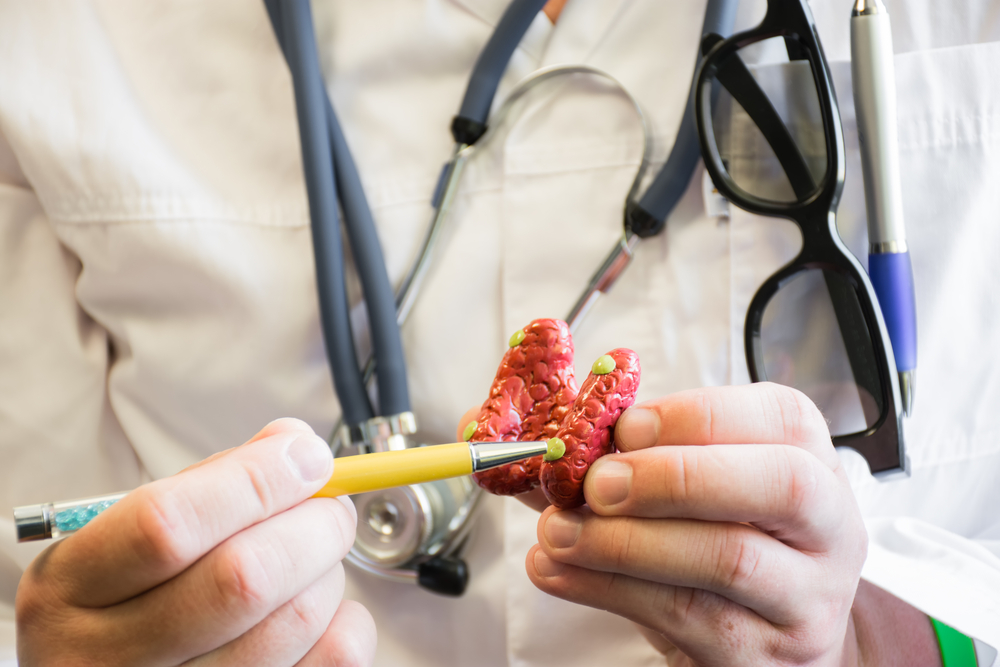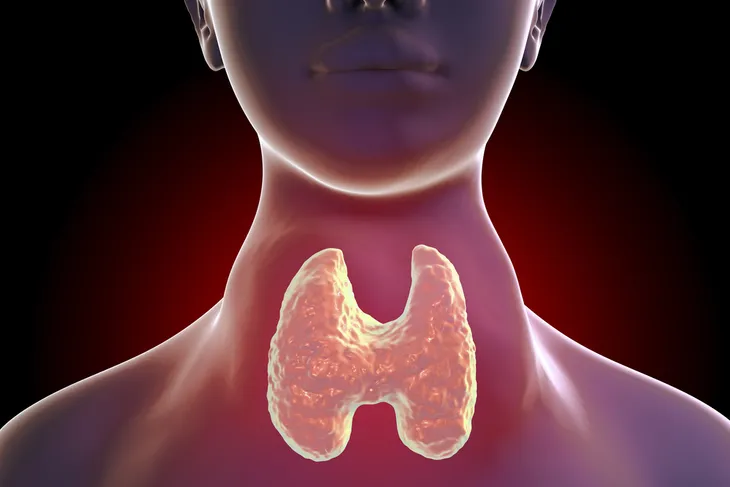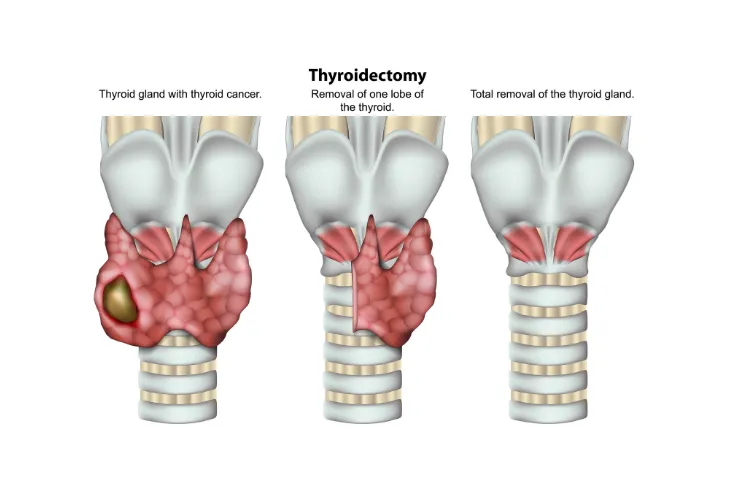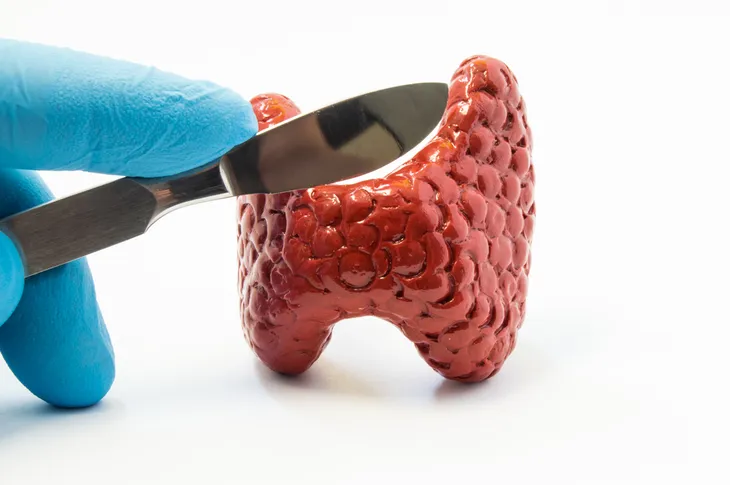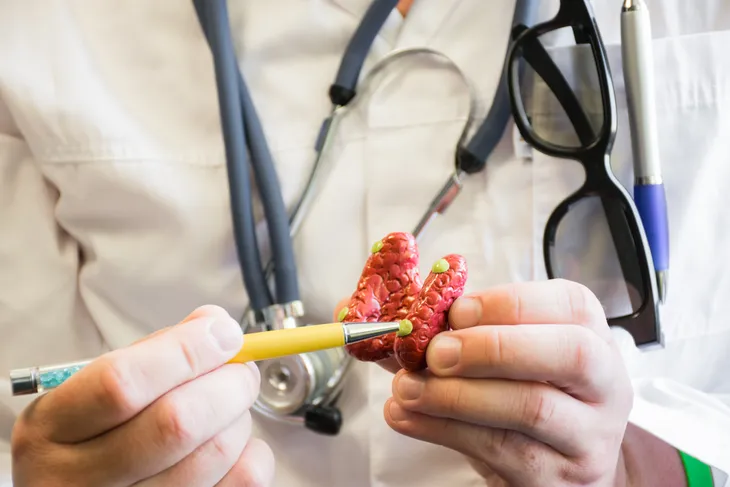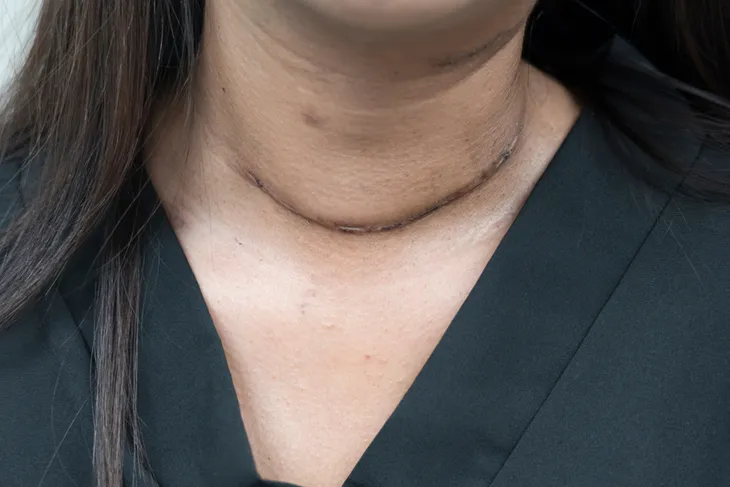The thyroid is an important butterfly-shaped gland located in the lower front of your neck, and you probably don’t pay much mind to it if it’s working well. It functions to regulate your metabolism, which is vital for your energy supply.
But like any part of your body, things can go wrong. It can produce too much thyroid hormone (known as hyperthyroidism), which has varying symptoms (including fatigue and anxiety), and in some cases, it may have to be removed in totality. Here’s what you should know about thyroid removal surgery.
Reasons For Thyroid Removal
According to Healthline, the most common reason you’d need a thyroidectomy (the medical term for partial/full thyroid removal) is due to nodules or tumors on the gland. It notes that while many times these nodules are benign, they can also indicate cancer and cause other complications.
For example, those nodules deemed benign can also grow and obstruct the throat or trigger conditions such as hyperthyroidism. A goiter (abnormal enlargement of the thyroid) is another reason that a thyroid gland would need to be removed, as it can impede eating and breathing according to the source. In other cases, such as Graves’ disease, the body attacks the gland thinking it’s a foreign body, leading to the overproduction of thyroid hormone.
Types of Thyroid Removal Surgery
The full thyroid is not removed in all cases. A doctor will consider the circumstances and make a choice based on a variety of factors, explains Medical News Today. It notes a hemithyroidectomy or lobectomy removes half of the gland, which is used when a nodule or “low-risk” thyroid cancer is contained within one side.
Meanwhile, there’s also the isthmusectomy that will target the isthmus that connects both lobes of the thyroid, adds the source. This is an option if the tumor is limited to this area. Lastly, the total thyroidectomy is usually the option in cases of thyroid cancer, nodules on both sides, and Graves’s disease.
Associated Risks
Doctors have been doing thyroid removal surgery for quite some time, and the history of the procedure may trace back as early as 952 AD. Whatever the case, generally, the operation is safe when done by an experienced surgeon. However, like any surgery, there are some risks (although uncommon) according to the American Thyroid Association (thyroid.org).
For example, some of the complications from thyroid surgery could include bleeding immediately following surgery that could lead to acute breathing problems or an injury to a nerve that could cause “temporary or permanent hoarseness,” says the source. It also notes there’s a chance of damage to the parathyroid glands (which reside on the back of the thyroid gland) that regulate levels of calcium in the bloodstream. The source goes on to note that the risk of serious complications is under 2-percent.
What To Expect During The Procedure
The good news is that as far as what happens during thyroid surgery, you won’t feel anything or remember it, as you’ll be under general anesthesia that knocks you out completely. The surgeon will carefully make a small neck incision to avoid damage to your windpipe, and the procedure takes about 2-hours.
Patients generally recover in the hospital under the watchful eye of staff, which will look for signs of complications (including bleeding or trouble breathing). You will be able to go home the same day following a thyroid surgery, says the source (unless a doctor decides to keep you overnight for closer observation).
How To Prepare For Surgery
Since the procedure involves general anesthesia, you’ll have to follow some rules beforehand to ensure a smooth operation. You may be prescribed medication for hyperthyroidism to help reduce bleeding afterwards and regulate your thyroid function, says the Mayo Clinic.
Because of the general anesthesia, you’ll probably be asked to avoid consuming food or drink for a number of hours prior to the procedure to avoid related complications. It also notes that you should pre-arrange for someone you trust to drive you home following the surgery.
What Are The Rules For Recovery?
Thyroid.org mentions there will likely be “physical restrictions” put in place following thyroid surgery to prevent a blood clot or damaging the stitches. It notes that surgeons often limit “extreme” activities for a few days or weeks, adding that swimming, vigorous sports, and heavy lifting should be avoided for at least 10-days.
The source adds that these limitations are short and “usually followed by a quick transition back to unrestricted activity.” Meanwhile, “normal” activity can resume the first day following the operation.
Medications Following Surgery
Whether you will require a thyroid pill following surgery depends on the type of surgery you had and other circumstances, adds Thyroid.org. It notes that if half the thyroid was removed, there’s an 80-percent chance you won’t need a pill unless you’re already being medicated for low thyroid hormone levels (known clinically as hypothyroidism).
Meanwhile, if you’ve had a complete thyroidectomy, you will require thyroid hormone replacement therapy for life. This is because your body no longer has a way to naturally produce thyroid hormones, explains the source.
